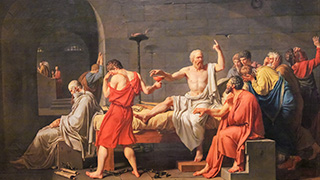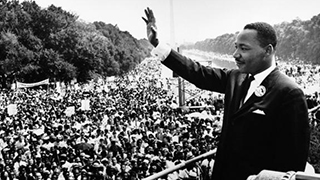Inside the Core: Core II Classes
Friday, January 19, 2024

Death of Socrates by Jacque Louis David, 1787
Inside the Core this week and into the next few weeks, Core II classes begin with readings from the
world of ancient Greece (Plato’s Crito and, for some classes, excerpts from Aristotle’s
Politics) and readings from the early Christian era (First Corinthians or the First
Letter of John, writings by Tertullian, Justin Martyr, Perpetua, and Augustine). These
writings highlight how Christianity, growing as it did out of the Jewish faith, interacted
with a very different cultural milieu when it entered the Greco-Roman world. A few
examples are the difference between the polytheism of the Greeks and Romans, as well
as their belief in the strict divisions among classes in society. However, these differences
do not mean that there were no points of dialogue or common ground between the early
Christians and the Greek and Roman culture surrounding them. In fact, one of the things
common to both the Crito, as a key text from that world, and the writings of the early
Christians is the emphasis on a willingness to die for what one believes to be right.
In Plato’s work, Socrates is facing death for teaching his students in ways found
offensive and even dangerous by the Athenian government. Put on trial for “corrupting
the youth of Athens,” as well as “atheism” (a misunderstanding of how he viewed divinity),
Socrates was condemned to death and was awaiting execution by drinking hemlock, when
his friend and former student, Crito, comes to visit him. The text is a dialogue between
the two, ending with Socrates convincing Crito that it is better to die being true
to one’s convictions than to live a compromised life.
Though the early Christians would disagree with much in the teachings of the ancient
Greeks, they would definitely have agreed with Socrates’ views on this concept of
laying down one’s life for what one believes. We see this in the New Testament (exemplified
most powerfully by the death of Jesus) and carried on in the teachings and practice
of his followers (Tertullian, Justin Martyr, and Perpetua, specifically). They all
believed it was not only better to die for one’s convictions than to compromise them,
but that it actually was a gift from God to be granted what was considered the “crown”
of martyrdom. These early Christians were motivated by their love for Christ as well
as their deep belief in his love for them. Socrates, on the other hand, was motivated
primarily by a passion for truth. But the Christians linked a belief in the truth
of Christ with their love for him, and Socrates also had a love for his students that
was part of his willingness to die for his beliefs. In other words, there is a point
of dialogue between these two positions. This kind of dialogue is at the heart of
what we do in our Core II classes. We also link the study of these texts, all of them
ancient, with more contemporary issues and figures, such as Martin Luther King, Jr.

Dr. Martin Luther King, Jr.
The beginning of this week of classes started with the celebration of King’s life and legacy. Seton Hall held a Symposium on Monday, Martin Luther King Day, with many speakers from our faculty and a keynote address by Obery Hendricks, Ph.D., Columbia University. It was a wonderful event, and in light of this recent celebration of his legacy, it seems fitting to quote from Martin Luther King, relevant to these Core readings. Speaking specifically about the early Christians (and challenging the church of his day to live as radical and committed lives as they did), he said in his “Letter from the Birmingham Jail”:
There was a time when the church was very powerful. It was during that period that the early Christians rejoiced when they were deemed worthy to suffer for what they believed. In those days the church was not merely a thermometer that recorded the ideas and principles of popular opinion; it was the thermostat that transformed the mores of society. Wherever the early Christians entered a town the power structure got disturbed and immediately sought to convict them for being "disturbers of the peace" and "outside agitators." But they went on with the conviction that they were "a colony of heaven" and had to obey God rather than man.
His challenge to the church of his time applies very much to the church and to all people of good will in today’s world. As these texts in the Core also show, it is only through a radical commitment to one’s beliefs, even to the point of death, that a person can change the world for good, and the legacy of Dr. King is a much more recent and powerful example of the living out of that kind of commitment.
Categories: Faith and Service, Nation and World
